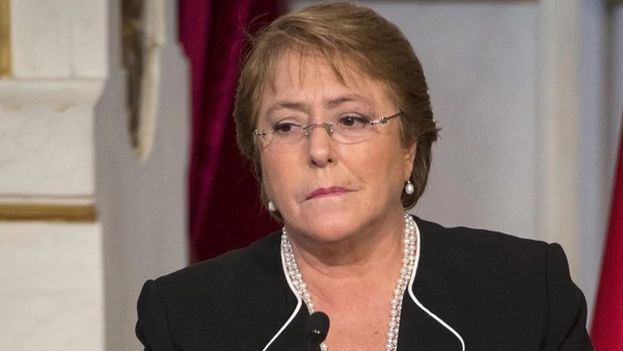
![]() 14ymedio, Yoani Sanchez, 7 January 2018 — Nine years ago, Michelle Bachelet met with Fidel Castro during his convalescence. The Chilean president left that meeting stating that she had seen the former president lively and “handling a lot of information.” Her words were used by the Plaza of the Revolution to spread a lie: that the Commander in Chief was in good health.
14ymedio, Yoani Sanchez, 7 January 2018 — Nine years ago, Michelle Bachelet met with Fidel Castro during his convalescence. The Chilean president left that meeting stating that she had seen the former president lively and “handling a lot of information.” Her words were used by the Plaza of the Revolution to spread a lie: that the Commander in Chief was in good health.
This January, a new visit from Bachelet could lend itself to spreading another fallacy: that the Government of Raúl Castro still has numerous allies in the region beyond its unconditional supporters Nicolás Maduro, Daniel Ortega and Evo Morales, when in fact the circle of comrades in Latin America it is very diminished, like never before in the last decade.
A few weeks before delivering the presidential sash to Sebastián Piñera, the Chilean leader arrived in Cuba on Sunday to close a cycle of loyalty that rests more on emotional attachment than on political pragmatism. Her closeness to Havana is marked by an ideological nostalgia that clouds her view and her ability to recognize the lack of rights that mark the lives of Cubans.
Bachelet is a comfortable fellow traveler for the island’s authorities, because she has never made public any criticisms or democratic demands. One of the few flare-ups that occurred between the two governments was caused by Fidel Castro when, after the Bachelet’s visit in 2009, he criticized Chile’s position in the border dispute, dating back to the 19th century, that blocked Bolivia’s access to the sea. At that time, the Chilean president expressed her annoyance over those statements.
In each of her two terms Bachelet avoided showing sympathy for the cause of Cuban dissidents and has declined any contact with the countless activists from the island who have visited her country in recent years. From her mouth, there has never been any condemnation of the political repression systematically carried out by Raúl Castro, even when the victims are women.
In his case, blindness and silence before the absence of freedoms in Cuba are not derived from ignorance. The Chilean press and the innumerable emigrants from the island in the southern country have let her know that her allies in Havana have been in power for almost six decades, forbidding other parties, repressing opponents and pushing their critics into exile.
The president, who a few weeks ago called her political adversary to congratulate him for having won in the second round of the presidential elections, knows that the lack of routine transfers of power sickens societies, impoverishes the solutions to any country’s problems, and entrenches one group in the highest spheres of power, a power that then ends up supplanting the name and will of the nation.
With her personal history, which includes the death of her father in prison, going underground and into exile, it is difficult to understand why the Chilean president does not face her Cuban counterpart and demand democratic changes, and much more so now that she herself is leaving power. That contradiction between her biography and her passivity before the Cuban dictatorship can only be understood from loyalty.
Bachelet has an old sentimental commitment to Castroism, although in her heart she knows that all that is left of the olive-green bearded ones, who once filled her dreams, is an immobilized gerontocracy. Calling on them publicly to respect the rights of their citizens would be like demolishing that utopia that she sighed for in her youth.
Like many other leftist politicians, the Chilean believes that if she points to the Plaza of the Revolution as a regime that violates human rights, it would be akin to going over to the side of the “right” and betraying her ideals. In order to maintain an ideological pose, she has been capable of choking back any signs and remaining silent before the acts of repudiation, arbitrary arrests and criminalization of thinking differently.
This Sunday began Bachelet’s last opportunity to amend her indifference and be consistent with her libertarian and democratic pedigree. One phrase, a few words, a meeting with activists, a tweet of commitment to the Cuban people and not to the Government, would be enough to repair her previous complicity.
Only with a gesture of this nature, will the visit of the Chilean president have been worth more than rubber stamping a memorandum of intention, closing some commercial agreement and serving Raul Castro to mask the growing loneliness that surrounds him in Latin America.
________________________________
The 14ymedio team is committed to serious journalism that reflects the reality of deep Cuba. Thank you for joining us on this long road. We invite you to continue supporting us, but this time by becoming a member of 14ymedio. Together we can continue to transform journalism in Cuba.
